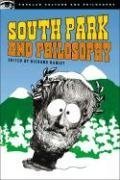C G M. (thefamilym) reviewed South Park and Philosophy: Bigger, Longer, and More Penetrating (Popular Culture and Philosophy) on + 3 more book reviews
Helpful Score: 1
Richard Hanley's South Park and Philosophy was a huge disappointment. As an avid fan of the boys since Season 2, I was expecting something much better than this. The first problem is that Hanley wrote almost all the essays in this book. That does not allow for a varied viewpoint. I've read the other books in this series and the viewpoints are much more varied.
It seems as though Hanley believes it's avant garde to constantly swear in his writing. As I said, I am a huge fan of South Park and find the foul language amusing because it is used in a way to make it funny. In Hanley's book, it gets in the way of his message. It is as if he is using it only because it amuses him and not for any practical purpose. He quotes more from "Team America: World Police" than from South Park. And while they have the same authors, the book is not called "Trey Parker and Matt Stone and Philosophy". A little focus would have gone a long way.
Hanley also likes to use a little logic trick called the Straw Man. He likes to set up opposing viewpoints in the most negative and easily defeated light and then try to draw a grander picture of whichever group he is going after. Needless to say, it's usually Christians, free market proponents, and Republicans. Not all Christians are Jerry Falwell; not all Republicans are Rush Limbaugh. But it makes it a cinch for him to attack conservative ideals once he puts reviled faces on the issues. Don't like universal health care? You must hate other people and yourself! You think people should have the right to keep and bear arms? You must hate children and yourself! If he wanted to talk about current political issues, this was precisely the wrong forum. Finally, when Stone and Parker write an episode condemning Mel Gibson he draws the conclusion that Stone and Parker rightly hate this right-wing fanatic. When they attack the anto-smoking lobby for their tactics, then they are just drawing an analogy to larger issues, not the fact that anti-smoking compaigners tend toward hypocracy. Because, after all, you don't hate children, do you?
Skip this book. You'll be happy you did. And to think I waited 6 months to get it!
It seems as though Hanley believes it's avant garde to constantly swear in his writing. As I said, I am a huge fan of South Park and find the foul language amusing because it is used in a way to make it funny. In Hanley's book, it gets in the way of his message. It is as if he is using it only because it amuses him and not for any practical purpose. He quotes more from "Team America: World Police" than from South Park. And while they have the same authors, the book is not called "Trey Parker and Matt Stone and Philosophy". A little focus would have gone a long way.
Hanley also likes to use a little logic trick called the Straw Man. He likes to set up opposing viewpoints in the most negative and easily defeated light and then try to draw a grander picture of whichever group he is going after. Needless to say, it's usually Christians, free market proponents, and Republicans. Not all Christians are Jerry Falwell; not all Republicans are Rush Limbaugh. But it makes it a cinch for him to attack conservative ideals once he puts reviled faces on the issues. Don't like universal health care? You must hate other people and yourself! You think people should have the right to keep and bear arms? You must hate children and yourself! If he wanted to talk about current political issues, this was precisely the wrong forum. Finally, when Stone and Parker write an episode condemning Mel Gibson he draws the conclusion that Stone and Parker rightly hate this right-wing fanatic. When they attack the anto-smoking lobby for their tactics, then they are just drawing an analogy to larger issues, not the fact that anti-smoking compaigners tend toward hypocracy. Because, after all, you don't hate children, do you?
Skip this book. You'll be happy you did. And to think I waited 6 months to get it!




